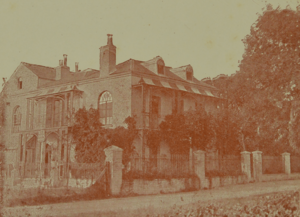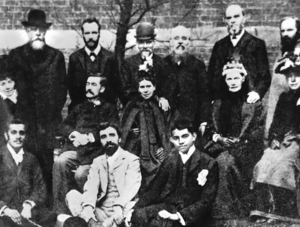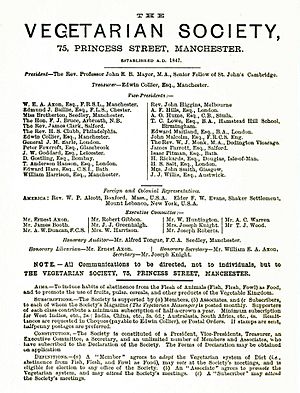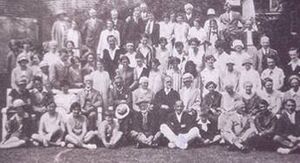Vegetarian Society facts for kids
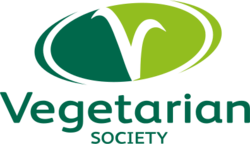 |
|
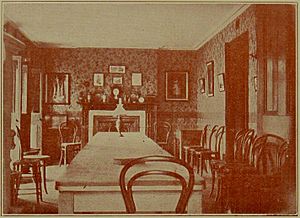
Interior of Northwood Villa, where the Society was founded in 1847
|
|
| Abbreviation | VSUK |
|---|---|
| Formation | 30 September 1847 |
| Founded at | Ramsgate, Kent, England |
| Merger of |
|
| Type | Charity |
| Registration no. | 259358 |
| Legal status | Charity |
| Focus | Vegetarianism |
| Headquarters | Manchester, England |
|
Region
|
United Kingdom |
|
Membership (2023)
|
6,500 |
|
CEO
|
Richard McIlwain |
|
Main organ
|
The Pod |
|
Revenue (2023)
|
£1,081,545 |
| Expenses (2023) | £1,426,451 |
|
Staff (2023)
|
18 |
The Vegetarian Society of the United Kingdom (VSUK) is a charity in Britain. It works to encourage people to eat less meat and more plant-based foods. The Society also has special trademarks for vegetarian and vegan products. It runs a cooking school and organizes National Vegetarian Week in the UK.
In the 1800s, many groups in Britain started promoting meat-free diets. This led to the creation of the Vegetarian Society in 1847. Later, it split into two groups, but they joined back together in 1969. Since then, the Society has continued to teach people about vegetarianism. It also helps food companies make more vegetarian and vegan options.
Contents
What the Vegetarian Society Does
| Vegetarian Society Approved | |
|---|---|
 |
|
| Effective region | Global |
| Effective since |
|
The Vegetarian Society works to help people change their diets. They want to reduce how much meat people eat. They also help leaders create a kinder food system.
Vegetarian Society Approved Trademarks
In 1969, the Society started its "Vegetarian Society Approved" trademark. This mark helps people know if a product is vegetarian. In 2017, they added a "Vegetarian Society Approved vegan" trademark.
Companies can use these trademarks on their products. This shows that the food has only vegetarian or vegan ingredients. It also means no animal products were used when making the food. You can see these marks on food in shops and on dishes in restaurants. For example, in 2022, McDonald's launched their McPlant burger in the UK. It has the Vegetarian Society Approved vegan trademark.
National Vegetarian Week
National Vegetarian Week is a big event for the charity. It began in 1992 as just one day. Now, it is a full week of activities. This event helps promote vegetarian eating across the UK.
Cookery School
The Vegetarian Society Cookery School teaches people how to cook vegetarian and vegan meals. They offer fun classes for everyone. The school also works with other groups to teach cooking. They even train professional chefs. This helps people start new careers in the food industry.
History of the Society
How it Started in the 1800s
In the 1800s, many groups in Britain were interested in meat-free diets. Three main groups helped form the Vegetarian Society. These were members of the Bible Christian Church, supporters of the Concordium, and readers of a journal called Truth-Tester.
Bible Christian Church
The Bible Christian Church started in 1809 in Salford. Its founder, Reverend William Cowherd, believed in a meat-free diet. They thought eating no meat, but including eggs and dairy, was a way to live a good life.
The Concordium (Alcott House)
The Concordium was a school near London that opened in 1838. Students at this school ate only plant-based foods. This is what we now call a vegan diet. In 1843, people from Alcott House created a group to promote kindness and avoiding animal foods.
The Truth-Tester Journal
The Truth-Tester was a journal that supported healthy living. In 1846, William Horsell took over the journal. He started promoting a "Vegetable Diet." In 1847, a letter in the journal suggested starting a Vegetarian Society. This led to a meeting in July 1847 at the Concordium. Many people attended, and they decided to meet again in September.
The Ramsgate Conference in 1847
On September 30, 1847, the planned meeting happened at Northwood Villa in Ramsgate. Joseph Brotherton, a Member of Parliament, led the meeting. The group chose the name "Vegetarian Society" by voting. They also elected their first leaders.
Early Growth and Challenges
The first big public meeting of the Vegetarian Society was in Manchester in 1848. It attracted 265 members. By 1853, the Society had 889 members. In 1849, London vegetarians started their own journal, The Vegetarian Messenger. It printed almost 5,000 copies each month.
However, after some key leaders passed away, the vegetarian movement slowed down. Membership numbers dropped in the 1860s and 1870s. By 1870, there were only 125 members left.
London Food Reform Society
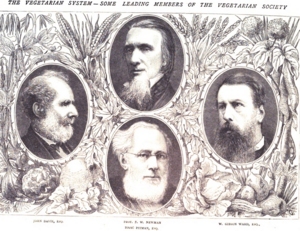
In 1875, the London Food Reform Society was created. It held free talks and debates. This group grew popular and attracted many new people. They felt the main Vegetarian Society in Manchester was not doing enough.
In 1888, the London group became independent. It was then called the London Vegetarian Society.
Different Views on Diet
From the start, there were different ideas about what "vegetarian" meant. Some members, especially from the Bible Christian Church, believed eggs, dairy, and honey were fine. Others, influenced by Alcott House, thought people should avoid all animal products.
Henry Stephens Salt wrote in 1886 that the main goal should be to stop eating meat. He also thought that dairy and eggs could be given up later. He focused on avoiding unhealthy foods.
Francis William Newman was president of the Vegetarian Society from 1873 to 1883. He allowed people who ate chicken or fish to be "associate members." He believed the Society should only focus on avoiding meat, fish, and fowl. Under his leadership, the Society grew a lot.
It occurs to me to ask whether certain grades of profession might not be allowed within our Society, which would give to it far greater material support, enable it to circulate its literature, and at the same time retain the instructive spectacle of a select band of stricter feeders... Yet, as our Society is at present (1871) constituted, all those friendly are shut out... But if they entered as Associates in the lowest grade... they might be drawn on gradually, and would swell our funds, without which we can do nothing.
Manchester and London Societies Split
The Manchester and London groups had different ideas about vegetarianism. In 1888, the London branch officially split off. It became the London Vegetarian Society (LVS). The original group was then often called the Manchester Vegetarian Society (MVS).
Arnold Hills was the first president of the LVS. Other members included Thomas Allinson and Mahatma Gandhi. The LVS members were often seen as more radical. The LVS helped create the Vegetarian Federal Union in 1889. By 1901, 21 vegetarian societies had formed.
The 1900s
In 1907, the Vegetarian Society celebrated its 60th anniversary. Both the MVS and LVS organized holidays and events for vegetarians.
World Wars and Food
World War I was hard for vegetarians. There were no special rules for them in the army. During World War II, food shortages happened. The government started rationing food. Vegetarians were given special ration books. These books gave them more cheese, eggs, and nuts instead of meat. About 100,000 people were officially registered as vegetarians during the war.
Many meals during the war had to be vegetarian because meat was scarce. The government even promoted vegetarian recipes. People ate more cereals and vegetables. Many kept these eating habits after the war.
The Vegan Society Forms
The debate about including eggs and dairy in a vegetarian diet continued. In 1944, Donald Watson, a member of the LVS, suggested a separate group. This group would be for people who ate no dairy or eggs. This led to the creation of The Vegan Society.
Reuniting the Societies
In the 1950s and 1960s, the Manchester and London societies started working together again. Many people wanted them to reunite. In 1958, their magazines combined. Finally, in 1969, they reunited to form the Vegetarian Society of the United Kingdom. They became a registered charity in September of that year.
Promoting Vegetarianism
In 1969, the Society introduced its seedling logo. In 1986, they started allowing food makers to use their logo. This showed that foods met their strict vegetarian rules. These rules included no animal flesh, no slaughterhouse byproducts, and no cross-contamination. This helped vegetarian symbols appear widely on food packaging.
In 1982, the Society opened The Cordon Vert Cookery School. In 1991, they held the first National Vegetarian Week. This event has happened almost every year since. It gets a lot of media attention and encourages many people to try vegetarianism. Vegfest, started in 1997, is a yearly celebration in Manchester.
In 1995, the Society made a film called Devour the Earth. Paul McCartney narrated it. He also became a supporter of the Society that same year.
The 2000s and Today
The Vegetarian Society Awards started in 2001. These awards recognize businesses that serve vegetarians in the UK. The events help raise money for the Society's educational work.
In 2003, the Society launched a "Fishconception" campaign. This was because many restaurants thought vegetarians ate fish. The campaign aimed to correct this mistake.
In 2017, the Vegetarian Society started Veggie Lotto. It is the first vegetarian and vegan lottery in the UK. Money raised helps train chefs and offers free cooking courses. It also promotes vegetarian and vegan food.
A historian named Ina Zweiniger-Bargielowska noted that the Society has grown. This is because people are more concerned about the environment, animal rights, and food safety.
In 2024, the Vegetarian Society changed its look. It got a new logo, magazine, and website. In the same year, the Society moved its main office to Ancoats, Manchester. In 2025, the Vegetarian Society opened COOK. This is a cooking center, supper club, and event space.
Presidents of the Society
| 1847–1859 | James Simpson |
| 1859–1870 | William Harvey |
| 1870–1873 | James Haughton |
| 1873–1884 | Francis William Newman |
| 1884–1910 | John E. B. Mayor |
| 1911–1914 | William E. A. Axon |
| 1914–1933 | Ernest Bell |
| 1937–1942 | Peter Freeman |
| 1938–1959 | W. A. Sibly |
| 1960–1987 | Gordon Latto |
| 1987–1989 | Isobel Wilson |
| 1996–1999 | Kathy Silk |
| 1999–2005 | Maxwell G. Lee |
Famous Supporters (Patrons)
The Vegetarian Society has had several well-known supporters. Rose Elliot, who joined in 2002, has written over fifty vegetarian cookbooks. Actor Jerome Flynn became a patron after becoming vegetarian at 18. Musician Paul McCartney and his late wife Linda became patrons in 1995. Their daughters, fashion designer Stella McCartney and photographer Mary McCartney, also became patrons. Television presenter Wendy Turner-Webster, who is vegan, became a patron in 2004. She promotes an animal-free diet.
See also
- European Vegetarian Union
- International Vegetarian Union
- Linda McCartney Foods
- List of animal rights groups
- List of vegetarian and vegan organizations
- North American Vegetarian Society
- Veganism
- Vegetarian Society (Singapore)
 | Lonnie Johnson |
 | Granville Woods |
 | Lewis Howard Latimer |
 | James West |


